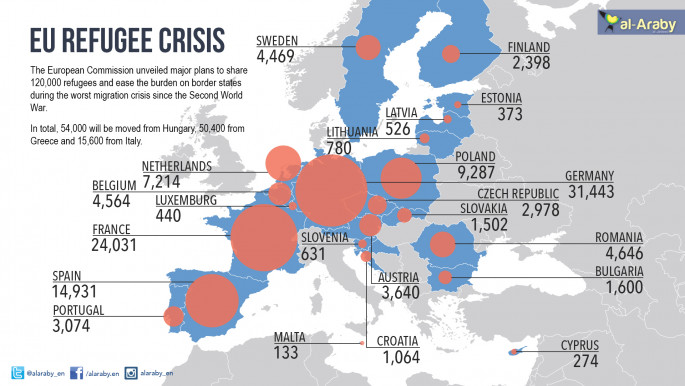EU to move 30,000 refugees out of Greece
EU to move 30,000 refugees out of Greece
The EU's resettlement scheme will see tens of thousands of refugees hosted in Greece shared around the European bloc.
2 min read
Greece has borne the brunt of the refugee crisis [AFP]
Around 30,000 refugees will be moved out of Greece by the end of 2017 to other parts of the EU, the European Commission said on Wednesday.
But the EU could still fall short of its plan to relocate 160,000 migrants across the continent.
The European Commission insisted there had been "important progress", yet so far only 5,651 eligible refugees - those "in clear need of international protection" - have left Greece and Italy under the scheme adopted in September 2015.
"Relocation has to succeed," Migration Commissioner Dimitris Avramopoulos said in a statement.
"With the increased capacity of the Greek Asylum Service, and if member states step up their efforts, it should notably be possible to relocate the remaining relocation candidates present in Greece (around 30,000) within the next year," the Commission said in a report.
Sharing the load
The resettlement plan introduced last year imposed refugee quotas on EU member states who had to take a share of new arrivals from overstretched frontline states like Greece and Italy.
More than 380,000 people arrived in Europe by sea in 2015, including close to 260,000 in Greece and 121,000 in Italy.
The relocation plans were outlined by EU Commission chief Jean-Claude Juncker after pictures of drowned Syrian refugee toddler Aylan Kurdi lying on a Turkish beach sparked global outrage.
However, mandatory quotas faced stiff opposition, especially from eastern EU states such as Hungary, which also saw an influx of migrants amid the biggest refugee crisis since the Second World War.
The UK decided to opt out of the scheme. Instead former Prime Minister David Cameron pledged to take in 20,000 Syrian refugees residing in camps in neighbouring countries over the next five years.
In light of the latest pledge to relieve Greece of thousands of migrants, emergency border checks introduced in the EU's supposedly passport-free Schengen Area by five countries are meanwhile allowed to continue, although the EU will only decide on a new six-month extension in November.
The executive arm of the EU also hailed the success of a deal with Turkey to reduce the flow of migrants over the Aegean Sea to Greece.
The EU has said it plans to restore Schengen to full borderless status by the end of the year.

But the EU could still fall short of its plan to relocate 160,000 migrants across the continent.
The European Commission insisted there had been "important progress", yet so far only 5,651 eligible refugees - those "in clear need of international protection" - have left Greece and Italy under the scheme adopted in September 2015.
"Relocation has to succeed," Migration Commissioner Dimitris Avramopoulos said in a statement.
"With the increased capacity of the Greek Asylum Service, and if member states step up their efforts, it should notably be possible to relocate the remaining relocation candidates present in Greece (around 30,000) within the next year," the Commission said in a report.
Sharing the load
The resettlement plan introduced last year imposed refugee quotas on EU member states who had to take a share of new arrivals from overstretched frontline states like Greece and Italy.
More than 380,000 people arrived in Europe by sea in 2015, including close to 260,000 in Greece and 121,000 in Italy.
The relocation plans were outlined by EU Commission chief Jean-Claude Juncker after pictures of drowned Syrian refugee toddler Aylan Kurdi lying on a Turkish beach sparked global outrage.
However, mandatory quotas faced stiff opposition, especially from eastern EU states such as Hungary, which also saw an influx of migrants amid the biggest refugee crisis since the Second World War.
The UK decided to opt out of the scheme. Instead former Prime Minister David Cameron pledged to take in 20,000 Syrian refugees residing in camps in neighbouring countries over the next five years.
In light of the latest pledge to relieve Greece of thousands of migrants, emergency border checks introduced in the EU's supposedly passport-free Schengen Area by five countries are meanwhile allowed to continue, although the EU will only decide on a new six-month extension in November.
The executive arm of the EU also hailed the success of a deal with Turkey to reduce the flow of migrants over the Aegean Sea to Greece.
The EU has said it plans to restore Schengen to full borderless status by the end of the year.






 Follow the Middle East's top stories in English at The New Arab on Google News
Follow the Middle East's top stories in English at The New Arab on Google News


![Algeciras port [Getty]](/sites/default/files/styles/image_330x185/public/75377010.jpeg?h=327453ef&itok=KfCFUEza)